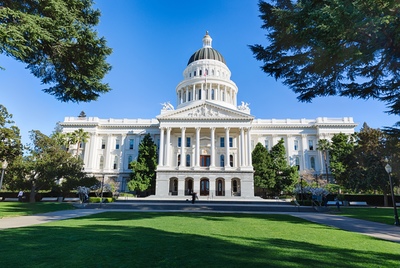
Compliance
How States Are Using AI for Compliance Enforcement in 2026
February 20, 2026 | Bradley Coffey

Key Takeaways:
If you’ve been following along with our Lobbying Mythbuster series, you know we reviewed municipal jurisdictions and their role in lobbying compliance in part two. In that context, “jurisdiction” meant “the limits or territory within which authority may be exercised.”
In part three, we will explore another meaning of jurisdiction: “the power, right, or authority to interpret and apply the law.” This meaning of jurisdiction is especially relevant at this time of year because conference season is upon us. Every year in the spring and summer, thousands of government affairs professionals flock to conferences put on by policymaker groups such as the Republican Governors Association (RGA), Democratic Governors Association (DGA), and the National Conference of State Legislatures (NCSL), as well as other industry conferences such as those put on by the American Legislative Exchange Council (ALEC). These events provide an unmatched opportunity for networking and building partnerships, and, given the presence of state and local covered officials, there are also ample opportunities for organizations and their lobbyists to engage in advocacy. (See our State and Local Groups Calendar for all upcoming industry meetings you may be interested in attending.)
It’s a very common misconception that lobbying activities at a conference are not subject to the same rules as other lobbying efforts. This is simply not true. For example, though you may be meeting with California legislators at a conference held in Dallas, the California officials are governed by California’s Fair Political Practice Commission regulations — and in interacting with them, so are you. This means that the same gift limits, thresholds, and registration and reporting requirements apply. California has jurisdiction over this interaction.
Similarly, having a meeting with officials from multiple jurisdictions to discuss your organization’s legislative priorities means you’ll need to take into account the lobbying requirements for each jurisdiction represented in the room.
Our favorite and oft-used way to illustrate this concept is: it doesn’t matter if you are meeting with a New York City official in City Hall Park, or in Seattle, or in Paris, or on the moon — the individual is still a New York City official and New York City still has jurisdiction. Changing the geographic location of the interaction does not affect that.
It sounds like a stressful headache, but before you cancel your conference registration, understand that a little advance planning can pay dividends. Here are a few things you can do ahead of time to ensure you’re prepared:
Familiarize yourself with the agenda
Peruse the attendee list
Make a list of top priorities
Understand the lobbying regulations in each of your priority jurisdictions
Once you’ve outlined your top priorities and have a clearer picture of who you’ll be talking to, it’s important to take the time to understand the registration thresholds and reporting requirements in the relevant jurisdictions. For example, if you know your organization is pushing a bill in Colorado, and the list of conference attendees includes a key Senator from Colorado, it’s critical that you understand the state’s basic rules of engagement — when registration is required, what activities are reportable, and the rules around expenditures.
If you’re a MultiState client, you can reach out and schedule time to review these requirements with a knowledgeable member of our team. You also have access to a multitude of informational resources to guide your activities on the go.
Keeping up with rules, deadlines, and often confusing requirements is a daunting prospect for teams of all sizes. Let us manage your federal, state, and local registration and reporting responsibilities, or manage your Campaign Finance program. Read more about our Compliance Services here, or get in touch here.
Information provided in this article is not legal advice and is not a substitute for actual legal advice and counsel directed at your specific situation.The examples used in this article are presented for illustrative purposes only and should not be considered an exhaustive list.

February 20, 2026 | Bradley Coffey
-328a36-400px.jpg)
February 20, 2026 | Kelly Cox
-8748f6-400px.jpg)
February 19, 2026 | Izzy Aaron